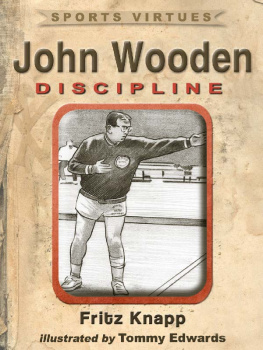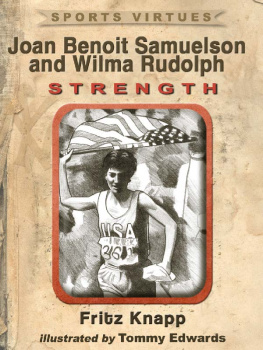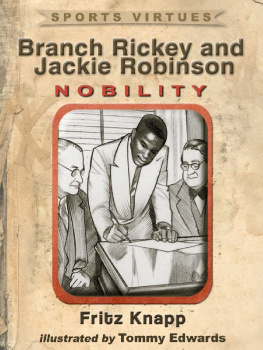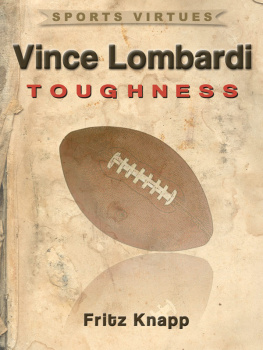Price World Publishing
www.PriceWorldPublishing.com
Scripture quotations are from the New Revised Standard Version Bible, copyright 1989 by the Division of Christian Education of the National Council of the Churches of Christ in the USA. Used by permission.
Copyright 2012 by Fritz Knapp
All rights reserved. Neither this book, nor any parts within it may be sold or reproduced in any form without permission.
Illustrations by Tom Edwards
Edited by Michael Wilt
eISBN: 9781619840430
Introduction
Their nicknames often seem to point to triumph: The Iron Horse, Captain Clutch, The Dominator, Mr. October, The Rocket, The Sultan of Swat, Air Jordan, Dr. J. But the true stories of many sports stars are much like those of any other human being. We all must, at some time or another, work and strive to overcome trouble, problems and hardship. Most of us do so on a smaller stageno lights, cameras, announcers, or postgame interviews. But there is much we can learn about how to live our own lives by studying the stories of great athletes who have overcome hard times and adversity.
The main characters in this series are well-known athletes and sports figures, men and women who have overcome personal misfortune through strength of character. Their stories inspire greatness in others. About ten years ago, I began to study athletes and the qualities that made them great. I was interested in more than their athletic abilities, impressive as those are in individuals who have made it to the top of their games. I was especially interested in their life abilities, the way they dealt with the variety of setbacks and struggles that all human beings encounter. In my study I read sports biographies by the dozens, and not just those of the most recent superstars. My reading took me as far back as the late 1800s. I found truly captivating accounts of athletes whose attitudes in their weak moments gave them more enduring legacies than they ever would have earned in athletic competition alone. As I entered some difficult personal times, these athletes became my friends and gave me a sense of hope that the struggles in my life would ultimately make me a stronger person.
I can personally identify with each athlete in this series. There is a part of me in every one of their stories. I have battled fatigue, failure and depression like U.S. Open golf champion Ken Venturi. I have had speech difficulties and low confidence like Amos Alonzo Stagg. My body has failed me at different times, as Gertrude Ederles and Lou Gehrigs bodies failed them. Despite lifes downside, though, I have been blessed with a source of strength that comes from deep within my soul and is a well-spring of incredible peace. This well has been fed, in part, by knowing otherssome personally and some through their storieswho fought hard to overcome their difficulties. My spirit has risen in the midst of trials, like an eagle in a storm soaring high above the mountains. But it is the Spirit that can turn tragedy into triumph, despair into hope, and defeat into victory. While the crises of life rage, Gods abundant grace is most present.
Each story in this series identifies a key personality trait demonstrated by a great athlete or sports figure in his or her struggle against adversity. Here you will read, for example, of the compassion of Gale Sayers and Brian Piccolo; the integrity of Arthur Ashe; the persistence of Althea Gibson; the wisdom of Happy Chandler. Through these and other stories, I hope you will find inspiration and a few new friends to help you along lifes journey. Get to know these people and you too will hear the lessons they teach. Let them be your mentors. Bring to your life the virtues described in these stories, and bring your own story into clearer perspective. Be true to who God made youa shining star in a dimming world. As St. Paul wrote, Adversity produces character, and character produces hope, and hope will not disappoint. Let adversity help turn you into the successful person God has created you to bea person of hope, a person of character.
DISCIPLINE
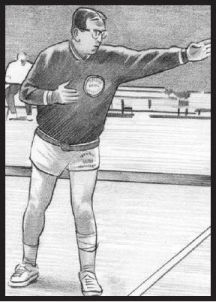
John Wooden
| DISCIPLINE: Self-control; orderly conduct. |
J ohn Wooden played and coached basketball tenaciously. As a coach, he emphasized conditioning and teamwork. Fast-breaking ofense designed to wear down the other team and tough defense keyed his teams successes. The UCLA teams he coached won seven straight national championships from 1967 to 1973, and ten out of twelve from 1964 to 1975. Of the court, Wooden was a loyal husband and devoted father, and he lived by the highest moral standards in every area of his life.

John Wooden was born October 14, 1910, in rural Hall, Indiana, the fourth and youngest of four boys born to Joshua and Roxie Wooden. The Wooden family farmed land Roxie had inherited from her parents. From a young age, John assisted his father, who worked at least twelve a day, six days a week, tending crops and livestock. Mr. Wooden taught his sons the importance of work and the role it played in keeping the farm productive. Sunday was always reserved as a day to rest and go to church. Mr. Wooden was a stern disciplinarian who corrected his sons misbehavior lovingly but firmly. John Wooden described his father as a man of gentle strength and someone who would always be fair with me and had my best interests at heart. Roxie Wooden, according to John, provided a role model for how to do my job regardless of the particular circumstances.
Sports were the best outlet for the Wooden boys. Their father also enjoyed sports, especially baseball, so he made sure he could participate in their fun. Because he and his son enjoyed baseball so much, Joshua Wooden cleared a section of farmland to make room for a baseball field. He also built their first basketball goal out of a tomato basket. Mrs. Wooden produced the ball from discarded linens stufed into old hosiery.
The Wooden household stressed education, too, and books were more prominent than sporting equipment. Mr. Wooden read and quoted books constantly. He passed on to his sons a love of literature and especially poetry. John Wooden would later say that his father profoundly influenced me, especially in the area of learning. Joshua Wooden held his sons to a high standard, but he also provided them a living example. He did not ask of them more than he could model himself. He did not tolerate foolishness, wouldnt drink, smoke, use foul language, or speak harshly about another person. His steadfast rule was that if one couldnt say anything nice about a person, they shouldnt say anything at all.
John Wooden treasured his relationship with his father. For more than half a century he kept a little piece of paper in his wallet that his father had given him in grade school. It read:
| 1. | Be true to yourself. |
| 2. | Make each day your masterpiece. |
| 3. | Help others. |
| 4. | Drink deeply from good books, especially the Bible. |
| 5. | Make friendship a fine art. |
| 6. | Build a shelter against a rainy day. |
| 7. | Pray for guidance, count and give thanks for your blessings every day. |
John Wooden put his fathers advice to good use. He studied hard and did well in school, played high school sports (football, basketball and baseball) with considerable success, and proved himself college material in an era when most high school graduates went to work rather than to college. He received a basketball scholarship ofer to attend Purdue University in West Lafayette, Indiana, in 1928, but at that time there were no pure athletic scholarships. All scholarships and grants required working as well as playing a sport. Wooden worked a variety of jobs, including waiting tables and selling programs at football games, all four years to pay the tuition his parents couldnt aford.
Next page
